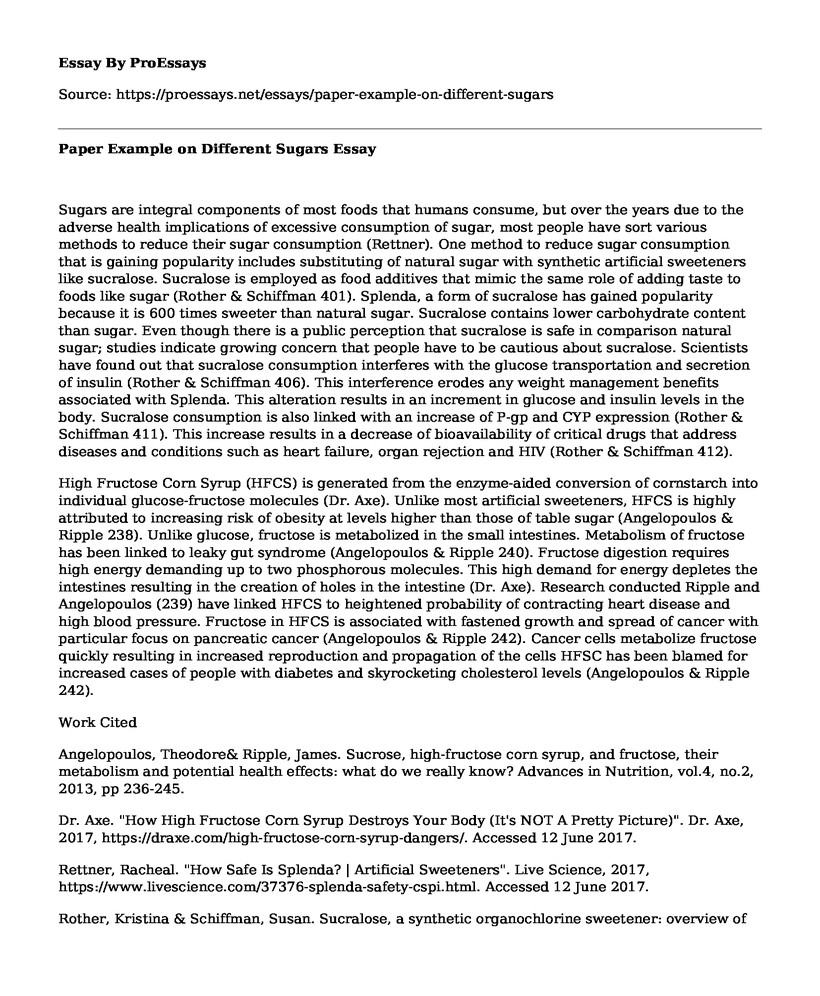Sugars are integral components of most foods that humans consume, but over the years due to the adverse health implications of excessive consumption of sugar, most people have sort various methods to reduce their sugar consumption (Rettner). One method to reduce sugar consumption that is gaining popularity includes substituting of natural sugar with synthetic artificial sweeteners like sucralose. Sucralose is employed as food additives that mimic the same role of adding taste to foods like sugar (Rother & Schiffman 401). Splenda, a form of sucralose has gained popularity because it is 600 times sweeter than natural sugar. Sucralose contains lower carbohydrate content than sugar. Even though there is a public perception that sucralose is safe in comparison natural sugar; studies indicate growing concern that people have to be cautious about sucralose. Scientists have found out that sucralose consumption interferes with the glucose transportation and secretion of insulin (Rother & Schiffman 406). This interference erodes any weight management benefits associated with Splenda. This alteration results in an increment in glucose and insulin levels in the body. Sucralose consumption is also linked with an increase of P-gp and CYP expression (Rother & Schiffman 411). This increase results in a decrease of bioavailability of critical drugs that address diseases and conditions such as heart failure, organ rejection and HIV (Rother & Schiffman 412).
High Fructose Corn Syrup (HFCS) is generated from the enzyme-aided conversion of cornstarch into individual glucose-fructose molecules (Dr. Axe). Unlike most artificial sweeteners, HFCS is highly attributed to increasing risk of obesity at levels higher than those of table sugar (Angelopoulos & Ripple 238). Unlike glucose, fructose is metabolized in the small intestines. Metabolism of fructose has been linked to leaky gut syndrome (Angelopoulos & Ripple 240). Fructose digestion requires high energy demanding up to two phosphorous molecules. This high demand for energy depletes the intestines resulting in the creation of holes in the intestine (Dr. Axe). Research conducted Ripple and Angelopoulos (239) have linked HFCS to heightened probability of contracting heart disease and high blood pressure. Fructose in HFCS is associated with fastened growth and spread of cancer with particular focus on pancreatic cancer (Angelopoulos & Ripple 242). Cancer cells metabolize fructose quickly resulting in increased reproduction and propagation of the cells HFSC has been blamed for increased cases of people with diabetes and skyrocketing cholesterol levels (Angelopoulos & Ripple 242).
Work Cited
Angelopoulos, Theodore& Ripple, James. Sucrose, high-fructose corn syrup, and fructose, their metabolism and potential health effects: what do we really know? Advances in Nutrition, vol.4, no.2, 2013, pp 236-245.
Dr. Axe. "How High Fructose Corn Syrup Destroys Your Body (It's NOT A Pretty Picture)". Dr. Axe, 2017, https://draxe.com/high-fructose-corn-syrup-dangers/. Accessed 12 June 2017.
Rettner, Racheal. "How Safe Is Splenda? | Artificial Sweeteners". Live Science, 2017, https://www.livescience.com/37376-splenda-safety-cspi.html. Accessed 12 June 2017.
Rother, Kristina & Schiffman, Susan. Sucralose, a synthetic organochlorine sweetener: overview of biological issues. Journal of Toxicology and Environmental Health. Part B, Critical Reviews, vol.16, no.7, 2013, pp.399-451.
Cite this page
Paper Example on Different Sugars. (2021, Jun 25). Retrieved from https://proessays.net/essays/paper-example-on-different-sugars
If you are the original author of this essay and no longer wish to have it published on the ProEssays website, please click below to request its removal:
- Book Analysis of Medical Apartheid, Authored by Harriet Washington
- Paper Example on Technology in Healthcare Provision
- Role of Homeland Security Department in Managing Hurricane Sandy and Katrina
- Transport Proteins on Strike Essay
- Essay Example on Osteocytes & Chondrocytes: The Cells of Skeletal Tissues
- Covid-19: US Battle for Socio-Economic and Political Stability - Essay Sample
- Paper Example on Triage Unit at St. Mary Medical Center: Delayed Diagnosis & Treatment







